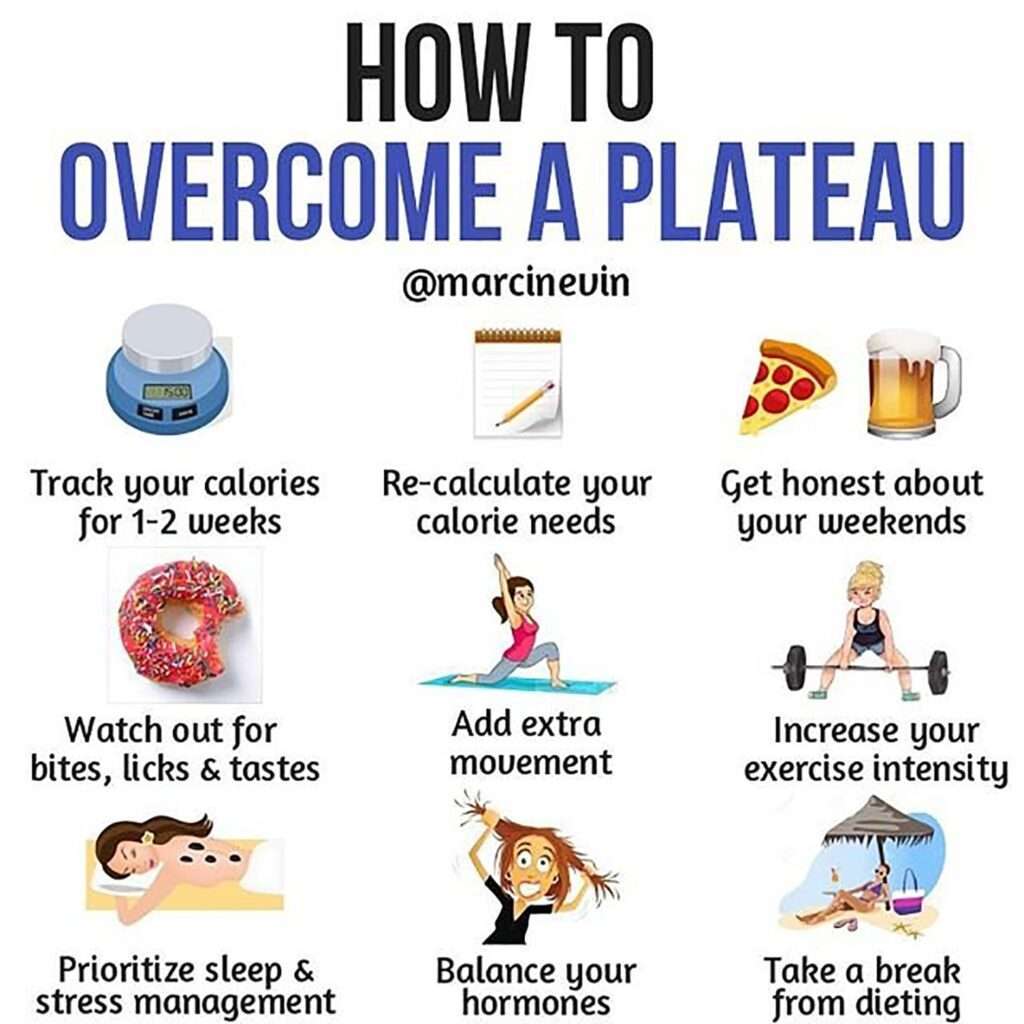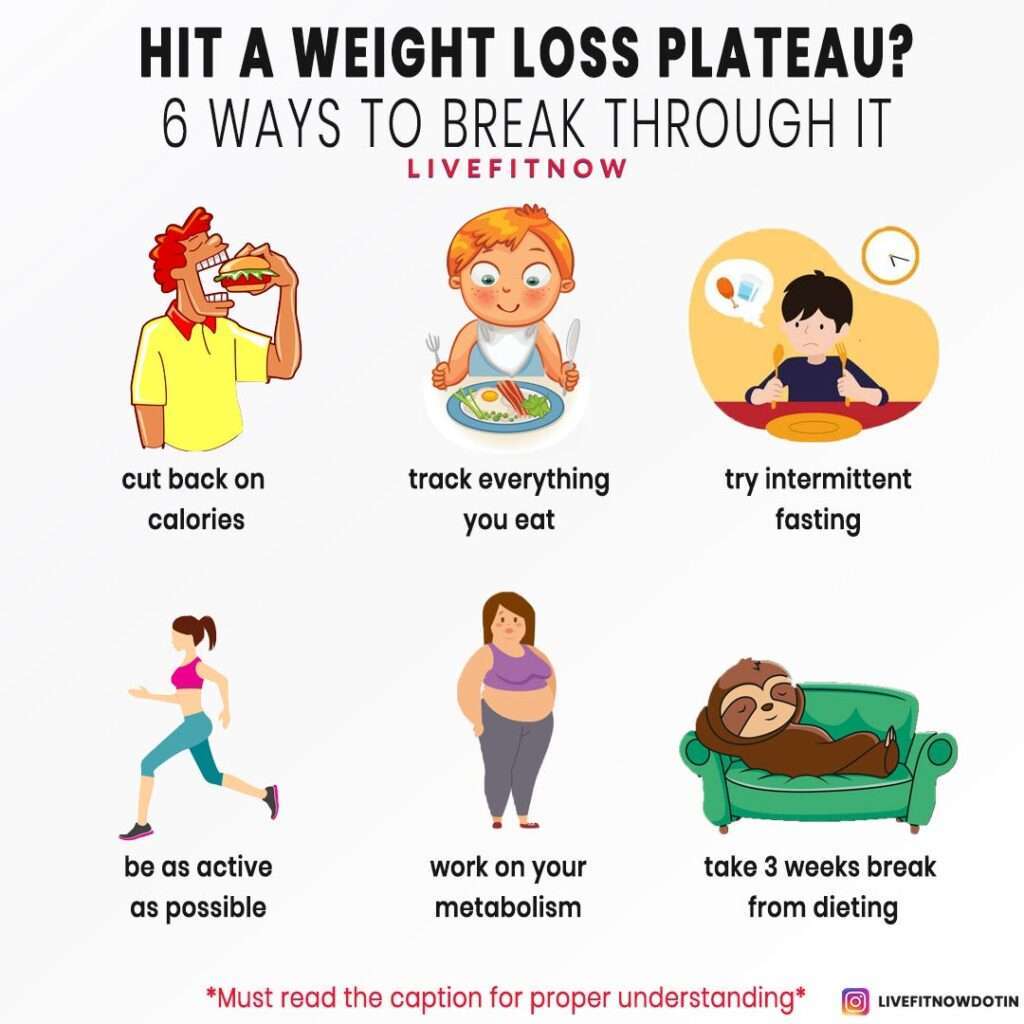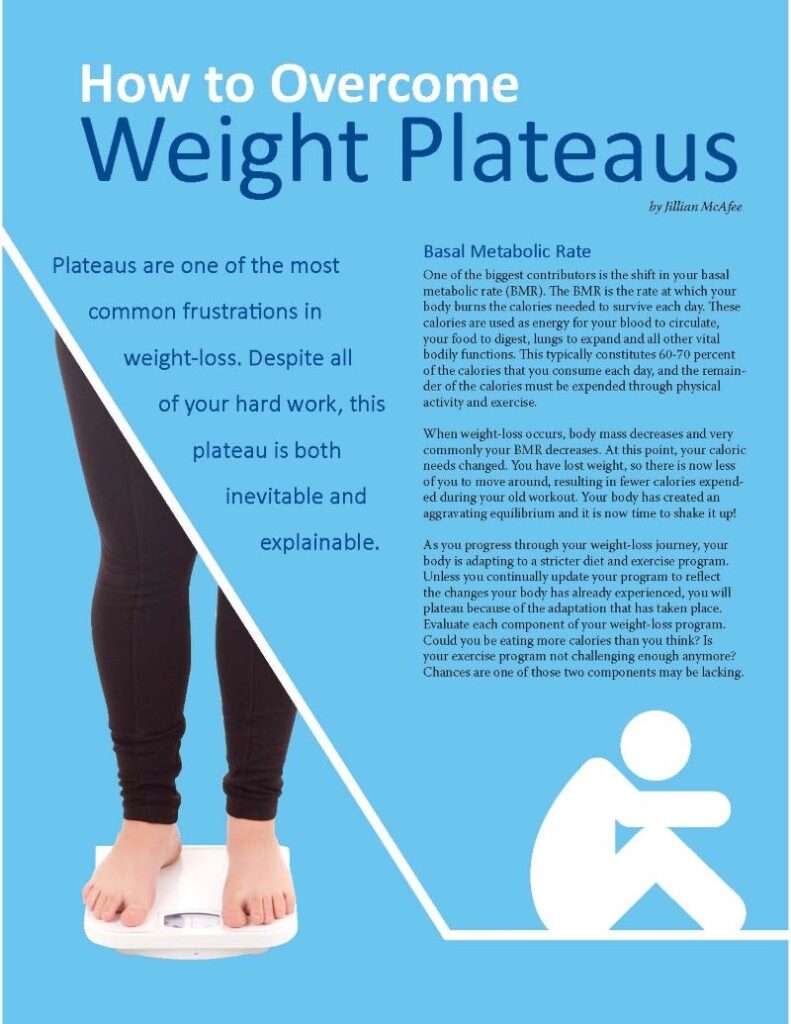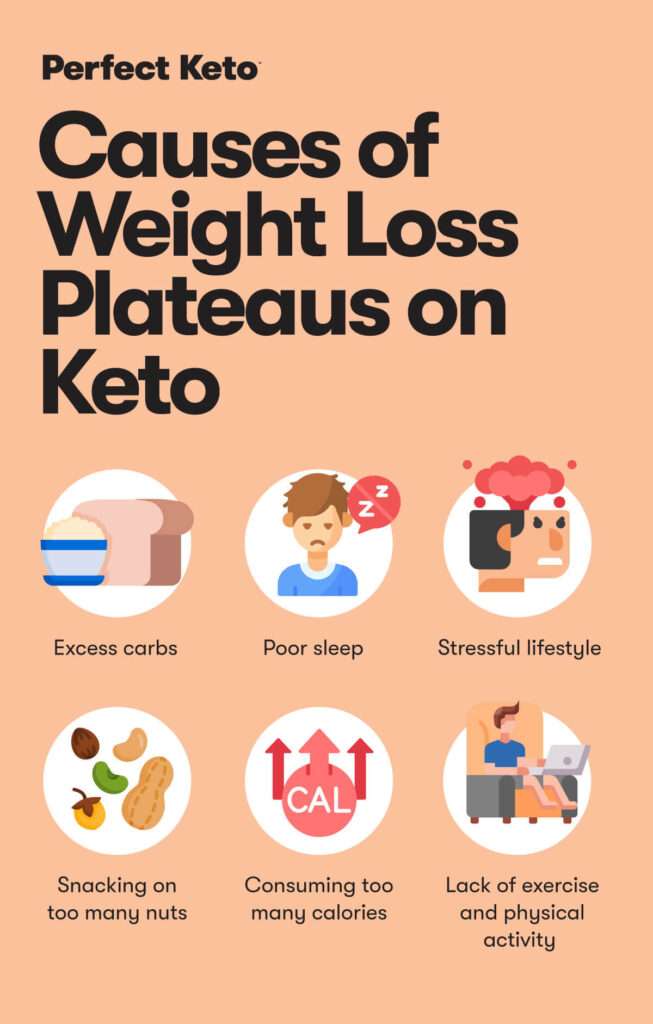So you’ve been putting in the effort to lose weight, but now you’ve hit a plateau. It can be frustrating when the numbers on the scale or the measurements don’t seem to budge anymore, despite sticking to your diet and exercise routine. But fear not, because there are ways to deal with weight loss plateaus and get back on track. In this article, we’ll dive into some strategies that can help you overcome this obstacle and continue making progress towards your weight loss goals.
One common reason for weight loss plateaus is that your body has adapted to your current routine. When you first started exercising and eating healthier, the changes you made created a calorie deficit, leading to weight loss. However, as your body becomes accustomed to this new lifestyle, it becomes more efficient at conserving energy, making it harder to create that calorie deficit. This is where making adjustments to your routine becomes crucial. By either increasing the intensity or duration of your workouts, or adjusting your calorie intake, you can shake things up and kickstart your weight loss again.
Another factor that can contribute to weight loss plateaus is stress. When you’re stressed, your body releases cortisol, which can hinder weight loss by increasing your appetite and slowing down your metabolism. Finding ways to manage and reduce stress, such as through exercise, relaxation techniques, or engaging in activities you enjoy, can help break through the plateau. Additionally, getting enough sleep is crucial for weight loss, as sleep deprivation can disrupt hormones that regulate appetite and metabolism, making it harder to lose weight.
In conclusion, weight loss plateaus are a common occurrence and can be quite frustrating. However, there are ways to overcome them and continue making progress towards your goals. By making adjustments to your routine, managing stress, and ensuring adequate sleep, you can break through plateaus and get back on track with your weight loss journey. In the following article, we’ll delve even deeper into these strategies and provide you with more tips and tricks to navigate weight loss plateaus successfully.

Understanding Weight Loss Plateaus
Definition of a Weight Loss Plateau
A weight loss plateau refers to a period of time where your weight remains stagnant despite continued efforts to lose weight. It can be frustrating and demotivating, especially when you have been working hard to shed those extra pounds. Understanding the causes and factors contributing to weight loss plateaus can help you overcome them and continue progressing towards your weight loss goals.
Factors Contributing to Weight Loss Plateaus
Several factors can contribute to a weight loss plateau. These include metabolic adaptation, inadequate caloric deficit, lack of physical activity, and loss of muscle mass.
Common Symptoms of a Weight Loss Plateau
Common symptoms of a weight loss plateau include no change in weight for weeks, despite following a strict diet and exercise routine. You may also notice a decrease in energy levels and motivation, which can further hinder your weight loss progress.
Causes of Weight Loss Plateaus
Metabolic Adaptation
One major cause of weight loss plateaus is metabolic adaptation. When you consistently restrict your calorie intake, your body’s metabolism may slow down as a way to conserve energy. This can make it harder for you to lose weight and may require adjustments to your diet and exercise routine.
Inadequate Caloric Deficit
Another cause of weight loss plateaus is an inadequate caloric deficit. If you are not creating a significant enough calorie deficit through your diet and exercise, your weight loss progress may stall. It is important to reassess your caloric intake and ensure that you are consuming fewer calories than you are burning.
Lack of Physical Activity
A lack of physical activity can also contribute to weight loss plateaus. Regular exercise not only helps burn calories but also increases your metabolism, leading to weight loss. If you have become complacent with your exercise routine or are not exercising enough, it may be time to incorporate more physical activity into your daily routine.
Loss of Muscle Mass
Losing muscle mass can also cause weight loss plateaus. When you lose weight, it is important to focus on both fat loss and muscle preservation. If you are not incorporating resistance training into your exercise routine, you may be losing muscle mass, which can slow down your metabolism and hinder weight loss.

Strategies to Overcome Weight Loss Plateaus
Reassessing Caloric Intake
To overcome a weight loss plateau, it is essential to reassess your caloric intake. Your body’s caloric needs may have changed as you have lost weight, so it is important to recalculate your calorie requirements. Consider adjusting your caloric intake slightly to create a larger deficit and kickstart your weight loss again.
Adjusting Macronutrient Ratios
In addition to reassessing your overall caloric intake, adjusting the macronutrient ratios in your diet can also help overcome a weight loss plateau. Focus on increasing protein intake, as it can help preserve muscle mass and boost metabolism. Decrease your intake of carbohydrates and unhealthy fats, as they can contribute to weight gain and slow down weight loss.
Incorporating High-Intensity Interval Training
High-Intensity Interval Training (HIIT) is a great way to overcome a weight loss plateau. It involves alternating periods of intense exercise with periods of rest or low-intensity activity. HIIT workouts are highly effective for burning calories and increasing metabolism, helping you break through weight loss plateaus.
Employing Progressive Overload in Strength Training
Progressive overload in strength training involves continuously challenging your muscles by increasing the intensity or resistance of your workouts. As you build more muscle, your metabolism increases, leading to improved weight loss. Incorporate progressive overload techniques such as increasing weights, repetitions, or sets into your strength training routine.
Increasing NEAT (Non-Exercise Activity Thermogenesis)
NEAT, or non-exercise activity thermogenesis, refers to the calories burned throughout the day during non-exercise activities such as standing, walking, and fidgeting. Increasing NEAT can help overcome a weight loss plateau by burning more calories throughout the day. Find ways to incorporate more movement and activity into your daily routine, such as taking the stairs instead of the elevator or going for a walk during your lunch break.
Implementing Dietary Modifications
Trying Different Meal Patterns (Intermittent Fasting)
Intermittent fasting is a dietary approach that involves cycling between periods of fasting and eating. It can help overcome weight loss plateaus by promoting fat burning and improving insulin sensitivity. Experiment with different intermittent fasting protocols, such as the 16/8 method or the 5:2 diet, to find the approach that works best for you.
Experimenting with Different Food Choices
Sometimes, certain foods may be causing a weight loss plateau without you realizing it. Experiment with different food choices and eliminate or reduce foods that may be triggering weight gain or hindering weight loss. Focus on whole, unprocessed foods, and listen to your body’s response to different foods.
Increasing Fiber Intake
Increasing your fiber intake can help overcome a weight loss plateau by promoting feelings of fullness and reducing overall calorie intake. Fiber-rich foods also tend to be nutrient-dense and can support overall health and well-being. Include foods such as fruits, vegetables, whole grains, and legumes in your diet to increase your fiber intake.
Staying Hydrated
Proper hydration is essential for overall health and weight loss. It can help suppress appetite, increase metabolism, and improve digestion. Make sure to drink an adequate amount of water throughout the day and limit your consumption of sugary drinks and alcohol, as they can contribute to weight gain.

Managing Psychological Aspects
Maintaining Motivation and Mental Resilience
Dealing with a weight loss plateau can be mentally challenging. It is important to maintain motivation and mental resilience during this time. Focus on the progress you have made so far and remind yourself of your goals. Surround yourself with supportive individuals who can help keep you motivated and accountable.
Tracking and Celebrating Non-Scale Victories
Weight is not the only measure of progress. Keep track of non-scale victories, such as increased energy levels, improved sleep quality, or fitting into smaller clothing sizes. Celebrate these victories and use them as motivation to continue your weight loss journey.
Minimizing Stress and Managing Emotional Eating
Stress and emotional eating can sabotage your weight loss efforts and contribute to weight loss plateaus. Find healthy ways to minimize stress, such as practicing mindfulness, engaging in relaxation techniques, or seeking support from a therapist. Additionally, develop healthier coping mechanisms for emotional eating, such as engaging in a hobby or reaching out to a supportive friend.
Seeking Support from Professionals or Support Groups
If you are struggling to overcome a weight loss plateau on your own, consider seeking support from professionals or joining support groups. Registered dietitians, personal trainers, or weight loss support groups can provide valuable guidance, accountability, and motivation to help you break through the plateau.
The Role of Sleep and Stress
Factors Influencing Weight Loss
Sleep and stress play crucial roles in weight loss. Lack of sleep can disrupt appetite-regulating hormones, leading to increased hunger and cravings. Chronic stress can also lead to hormonal imbalances, making it harder to lose weight. Keeping these factors in check is essential for overcoming weight loss plateaus.
Optimizing Sleep Quality and Quantity
Make sleep a priority and aim for a consistent sleep schedule. Ensure you are getting enough sleep each night, which is typically between 7-9 hours for adults. Establish a relaxing bedtime routine, create a comfortable sleep environment, and limit exposure to electronic devices before bed to optimize sleep quality and quantity.
Implementing Stress-Reduction Techniques
Incorporating stress-reduction techniques into your daily routine can help overcome weight loss plateaus. Practice activities such as meditation, deep breathing exercises, yoga, or journaling to manage stress levels. Find what works best for you and make it a regular part of your self-care routine.

Reevaluating Exercise Routine
Adding Variety to Workouts
Adding variety to your workouts can help overcome a weight loss plateau. Your body can adapt to repetitive exercises, making them less effective for weight loss over time. Incorporate different types of workouts, such as cardio, strength training, and flexibility exercises, to challenge your body and break through the plateau.
Increasing Overall Physical Activity Level
In addition to structured workouts, increasing your overall physical activity level throughout the day can help overcome a weight loss plateau. Look for opportunities to move more, such as taking walking breaks during work, parking further away from your destination, or participating in active hobbies or sports.
Incorporating Resistance Training
Resistance training is a key component of overcoming weight loss plateaus. It helps build lean muscle mass, which increases metabolism and promotes fat burning. Incorporate resistance training exercises, such as weightlifting or bodyweight exercises, into your routine to boost your weight loss efforts.
Listening to Your Body’s Signals
Listening to your body’s signals is crucial when dealing with a weight loss plateau. Pay attention to hunger and fullness cues, as well as energy levels during and after workouts. If you are feeling excessively fatigued, it may be a sign that you need to rest and recover. Give your body the rest it needs to prevent burnout and support optimal weight loss.
Tracking Progress and Adjusting Goals
Different Metrics to Monitor Weight Loss
Instead of solely relying on the scale, track progress using different metrics. Measure body circumferences, take progress photos, or use body composition analysis tools to get a more comprehensive view of your progress. Remember that weight is not the only indicator of success, and these metrics can help you focus on overall health and well-being.
Setting Realistic Goals
When experiencing a weight loss plateau, it is important to reassess your goals and ensure they are realistic and achievable. Setting overly ambitious goals can lead to disappointment and frustration. Break your larger goals into smaller, more manageable milestones, and celebrate each achievement along the way.
Reassessing and Modifying Goals Regularly
Goals should be dynamic and adaptable. Regularly reassess and modify your goals as needed to ensure they remain relevant and achievable. This allows for flexibility and continued motivation as you navigate through your weight loss journey.

Importance of Patience and Consistency
Understanding the Natural Fluctuations
Weight loss is not linear, and it is normal to experience natural fluctuations. Plateaus are a part of the weight loss process and should be expected. Understanding that weight loss takes time and that plateaus are temporary can help you stay patient and focused on your long-term goals.
Avoiding Impatience and Frustration
Impatience and frustration can derail your progress and lead to unhealthy behaviors. Avoid the temptation to resort to extreme measures or fad diets to break through a weight loss plateau. Instead, stay consistent with healthy eating habits, regular exercise, and self-care practices.
Consistency as the Key to Long-Term Success
Consistency is key when it comes to overcoming weight loss plateaus and achieving long-term success. Stick to a healthy and balanced diet, exercise regularly, prioritize sleep and stress management, and implement the strategies discussed in this article consistently. Remember that adopting a sustainable lifestyle, rather than relying on quick fixes, will lead to lasting results.
Conclusion
Dealing with weight loss plateaus can be challenging, but with the right strategies and mindset, you can overcome them. Understanding the factors contributing to plateaus, implementing appropriate strategies, and embracing a holistic approach to overall wellness are all essential components of breaking through a weight loss plateau. Stay motivated, stay consistent, and remember that progress takes time.
